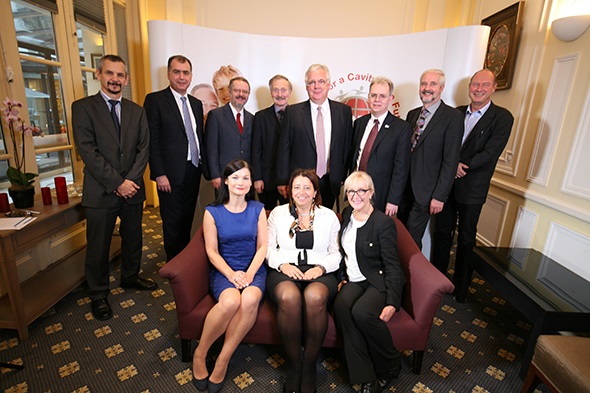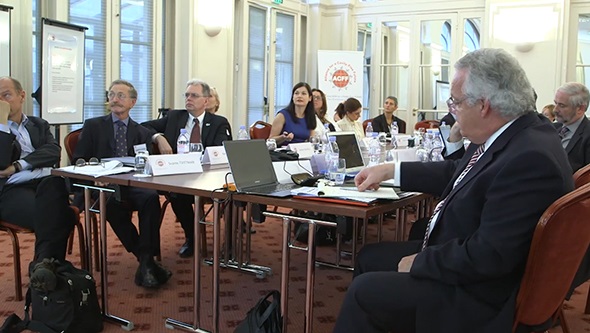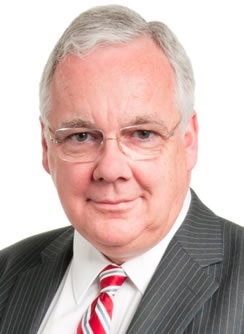Globally, dental caries (the technical term for tooth decay) is the most prevalent non-communicable disease, affecting 80% of the global population. Healthy teeth support overall well-being, while dental caries can contribute to high levels of pain and anxiety, as well as leading to other medical problems.
We Europeans care about our appearance as well as our health. The social and health impacts of tooth decay lead 40% of Europeans to say they are not satisfied with the health of their teeth. Caries is particularly prevalent in parts of Eastern Europe and in more socio-economically deprived areas generally.
In Europe, and globally, there is a substantial lack of public awareness of the burden of dental caries. This was one of the catalysts for the creation of the Alliance for Cavity-Free Future (ACFF), a non-profit charitable organisation led by a team of dental experts, which I chair at a global level.
Committed professionals from dozens of countries have joined forces with the aim of implementing changes to dental health practices across the globe, with a view to controlling dental caries and creating a cavity-free future.
ACFF have been fortunate enough to secure the engagement of a Global panel of dental experts, and also support from Colgate-Palmolive Company. Colgate works to improve oral health through its partnerships with the dental profession, government and public health agencies.

What evidence is there for a causal link between sugar intake and tooth decay and what are the latest guidelines from the WHO?
High dietary sugar intake has been scientifically determined through numerous studies to be a strong contributor to tooth decay. The relationships in this multi-factorial disease are quite complex but a systematic review conducted for the WHO has demonstrated a clear link.
In the last 60 years the amount of sugar contained in our diets has increased dramatically. This is partly through changes to ingredients and manufacturing processes, but also due to the fact that much of the global population has far easier access to foods that contain high amounts of sugar than before.
It is getting harder and harder to monitor and limit the amount of sugar in our diets, as in addition to our ‘sweet treats’ we are often consuming hidden sugars which are found in products such as fruit juices and convenience foods, which may not be generally considered to have high sugar levels.
Due to this growing challenge there is currently a lot of discussion within the dental profession about diet and ways to help people keep their dietary sugar intake within daily recommended limits.
Last year the WHO issued draft guidelines recommending that the daily dietary sugar intake be halved. This new guidance would allow a suggested 25g/day for women (the equivalent of two small chocolate bars) and 35g/day for men (equivalent to a 330ml can of Cola).)
These recommendations may be assumed by many to have been introduced because of rising levels of obesity or diabetes, but the basis for these recommendations comes predominantly from scientific data gathered on the link between sugar and dental caries.
The WHO recognised that the consumption of ‘free sugars’ should be as low as possible to minimise the risk of dental caries, which once triggered can become a lifelong battle.
This issue has recently been discussed at length across Europe, and the Pan-European ACFF discussions on this topic have included input from an advisor to the WHO.
We believe that to begin to tackle this problem it is important for us as an Alliance to engage with the public, fellow healthcare professionals, and EU politicians to raise awareness of the dangers to oral and general health.
We are looking to expand the ACFF’s goals to include the delivery of guidance for assessing and monitoring diet based risk factors as well as inequalities in the levels of successful caries prevention across Europe.
Should dental practitioners be working with individuals to help reduce their dietary sugar intake?
Dental practitioners are uniquely positioned to be able to help their patients improve their oral care habits. Appropriate advice on diet and nutrition is of course a part of this responsibility.
Simple, clear advice on making changes in oral care habits can and should be offered, and encouragement and instruction as to the reasons these moves are necessary can help to persuade a person to implement and continue with the changes.
Patients need to feel as if their dental team is on their side. The personal dialogue between dentist and patient is instrumental in triggering change, and practitioners can assist the patient in planning for the most effective way to create new habits and behaviours and motivating them to strive for results.
In order to offer the best advice, practitioners need to keep up to date with the latest research into comprehensive caries management and prevention. The ACFF works alongside other dental health advocacy groups, such as the Global Collaboratory for Caries Management (GCCM), who are implementing the ICCMS™ International Caries Classification and Management System, a set of guidelines to ensure that appropriate care measures and treatment options are used by practitioners at each stage of a patients caries development.
In using this system dental practitioners are offered access to e-learning tools and patient communication guidelines to deepen their understanding of the system and assist them in the implementation of their patient care and caries management programmes. The importance of offering correct advice on all aspects of caries control, including diet, is explained within these guidelines.
What are the main challenges in implementing behavioural changes such as reducing sugar intake?
One wall we need to break down before we can be truly start working for a change in behaviour is to understand why people behave in a certain way in the first place. In a number of countries, oral health is hugely neglected as an issue.
Education plays a major role in what is required to ensure change is implemented in any field. People need to understand the importance of oral care and the risks attached to sugar intake.
The ACFF exists to disseminate the necessary information to all stakeholders, patients and dental teams alike. We rely heavily on making links and contacts throughout Europe and the world that are able and willing to help share the information on effective prevention with their communities.
People’s desire to adjust behaviours, particularly when talking about diet, is also hindered by society’s view towards sugar. Sugar is still not widely recognised as a health issue, despite research suggesting that it can be harmful to not just oral but general health.
When we succeed in passing on the correct information and informing people of the dangers of a high sugar diet, a large degree of responsibility will still always fall on the individuals themselves.
We can advise and create opportunities for people to make changes, but the choice as to what foods people buy, make and consume is ultimately up to them. A willingness to change is essential, and this unfortunately is something we can only influence, not enforce.
How can these challenges be overcome?
These challenges are being tackled systematically, and the key is collaboration. In recent years the ACFF has brought together many of Europe’s leading dental experts and Associations who are regularly communicating with both the public and dental professionals in their own countries and Pan-Europe. This is helping us to widen the reach of our net and also to ensure that any actions we take and programmes we offer are not purely a copy of policy lifted from somewhere else, but that we are able to work with countries from within to create programmes that are tailored to local needs.
This means that we can also initiate changes that are relevant and beneficial to each region and population. Whilst caries is a global issue, we need to empower local communities and dental teams as much as possible to give targeted and comprehensive advice. We have launched over 20 local in-country ACFF chapters, and are looking to launch many more in the coming year.
The ACFF aims to engage with other dental associations and also have links with at least 90% of EU dental schools, which allows us to assess and address gaps in dental teaching at all levels. This is enabling us to improve our approach to dealing with dental caries and the effects of high dietary sugar intake and poor oral care habits, with a view to creating increased awareness from within the dental profession, and a more unified approach to methods of treatment and especially prevention.
How people view sugar is a big problem and the ACFF is currently linking with nutritionists, paediatricians and other healthcare professionals with reference to their part in caries prevention and management programmes.
Through pan-European surveys we are seeking out where there is misinformation in public perception and understanding of oral health issues, and using the results to ensure that we address the areas that most desperately need to be clarified.
By ensuring that we present consistent messaging to the public across the healthcare spectrum, we hope to be able to shift public perception of the problems surrounding excessive sugar intake, which will also work to positively influence future public health policy decisions, and ultimately should lead to increased willingness from the public to adopt appropriate oral care practises.

Can eating 5 portions of fruit and vegetable a day damage your teeth?
Fruit and vegetables in their natural forms do contain certain sugars, but on the whole they are healthier for you than sweets and junk food, as they are lower in fat and higher in vitamins.
They are not specifically damaging to your teeth in normal quantities, but as with any foods, you must make sure that you monitor your intake.
Also, the form in which you consume the fruit can change how it affects your teeth. Fruit juices can represent a specific caries hazard, particularly for young children, and when given in excessive amounts.
Please can you outline the main goal and mission of the Alliance for a Cavity-Free Future (ACFF) and how you plan to achieve this?
The main global goal of the ACFF is for every child born from 2026 and thereafter to be cavity-free for life. Our message is that the early form of caries is preventable, and reversible with proper dental care and good personal oral care habits.
To achieve this goal, the Alliance believes that collaborative action is required to raise awareness of dental caries and positively influence people’s personal oral care habits.
The ACFF Pan-European Chapter is also working to ensure that appropriate caries prevention and management can be implemented across Europe, and to address and reduce the inequalities in caries prevention and management practices within and across European States, to see improvements in both oral and general health.
What impact would a cavity-free future have?
To be cavity-free means being free from a serious oral health problem which would otherwise have a negative socio-economic impact on an individual’s life. Caries is a preventable disease and the economic implications of the levels of treatment currently required are huge.
By championing prevention over treatment we will be freeing up massive sums of money both back into the healthcare systems and also into patient’s pockets.
We are working towards a future in which people can be proud of their teeth, not dealing with the unnecessary pain and stress that comes from suffering from tooth decay. Oral health would be improved, which leads to improvements in overall wellbeing. Definitely something to smile about.
Where can readers find more information?
The ACFF has a great website with lots of information for individuals, families and professionals. We also have a YouTube channel where you can hear about our latest news and to listen to advice from dental experts across Europe.
We plan to be active on social media in the near future so keep an eye out for what we have in store and join with us in our mission to stop caries now for a cavity-free future.
Website: www.acffeurope.com
YouTube: www.youtube.com/ACFFEurope
About Professor Nigel Pitts
 Professor Nigel Pitts has been Director of the Dental Innovation and Translation Centre at King’s College London since 2013.
Professor Nigel Pitts has been Director of the Dental Innovation and Translation Centre at King’s College London since 2013.
Alongside his work at King’s, he is leader of the Global Collaboratory for Caries Management (GCCM) initiative and co-founder and chair of the Alliance for Cavity-Free Future (ACFF).
He is also an Honorary Consultant in Dental Public Health to Guy's and St Thomas' NHS Foundation Trust and a Past President of the European Organisation for Caries Research (ORCA) and the European Association for Dental Public Health (EADPH).
He has recently been awarded the prestigious John Tomes Medal for his involvement in scientific work in fields related to Dentistry and Dental Surgery.